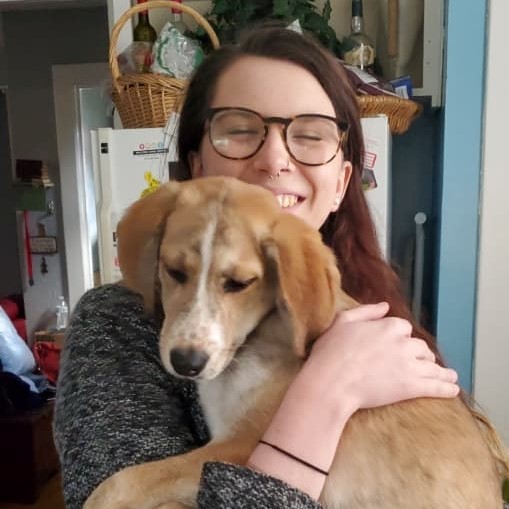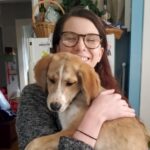
By Sandy Chilson
Director of Marketing and Outreach
Author of chocolate, featured in Songs of Survival, Vol. I Iss. I
Have a story you’d like to share about survival? Submit your piece, whether it be poetry, prose, art, or photography, to our literary journal, Songs of Survival!
I’ve always found it easier to write letters or send texts to people than to speak to them face-to-face. There’s something freeing about having time to curate my thoughts and hide during a tough or awkward conversation, to avoid someone hearing the tremor in my voice or seeing my bottom lip quiver as I try not to cry. There are things in my life that I can’t bring myself to share out loud, but recently, I have found respite in writing.
After being in an abusive relationship at 16 that has left me with PTSD to this day, I felt like I couldn’t tell anybody. And I didn’t for years, but when I did mention it, I beat around the bush and felt awkward and uncomfortable. I didn’t like using the specific terminology to describe what had happened to me but, by refusing to do so, I could never assert the extent of my trauma. Eventually, my experience was just reduced to “the bad boyfriend,” because that was all I could manage to say out loud. It was so much more, but I just couldn’t make the words leave my mouth.
I kept quiet about it for years as I suffered and bore the pain by myself. The frequent nightmares that still wake me up drenched in sweat, the panic attacks whenever I got close to a certain part of town, the startled responses and running away from curly brown-haired men in public, I just kept it to myself. I didn’t know how I would tell anyone. Not even texts could make this a bearable topic to broach.
But my God, did I want to tell somebody.
Starting Survivors to Superheroes with Jules and Jamie was an amazingly healing experience. It gave me hope and support, but even then, I was still suffering in silence, refusing to elaborate on what had really happened to anyone but the two of them. I am by no means a writer, but in December of my senior year of college, I sat down and wrote a very cathartic piece of poetry. For some reason, being able to articulate my story via poetry gave me a strength that I didn’t anticipate: I shared that poem with several of my friends to whom I had never divulged the truth. I felt a weight lifting off of me just by putting it out there. It didn’t change the lasting effects of the trauma, but no longer bearing the burden alone was more relief than I could have ever imagined.
Telling my story as a piece of art, as poetry, felt not only bearable, but powerful. Being able to imbue the story with feeling and intentional artistic choices gave me control. I was no longer the victim in my own story; I was the narrator. I still feel okay sharing my poem with people. In fact, I want to. As much as I can tell people how confused and lost I was, it doesn’t have the same effect as reading the words scattered across the page so that the reader feels my confusion. They can feel the sense of falling down the page, jostling from left to right, unclear where each line ends and the next begins. The artistic license that I can take with poetry does my story justice in a way that I couldn’t achieve with plain old words, spoken or written.
I’m grateful for the opportunity to publish this poem in Songs of Survival. This is my chance to open up in a way that feels comfortable and powerful to me. This is what my survival looks like. I hope that others find the same power over their own story, whether it be through prose, poetry, visual art, or anything in between.

Sandy Chilson
In high school, I envied my classmates who had typical teenage drama, day in and day out; did you hear who got caught drinking last weekend, I heard he has a crush on me, she kissed him behind the bleachers? I desperately wanted that to be my drama, but I never got to be a regular 16 year old. I spent my days in class with my rapist, visiting him on my lunch break and getting Starbucks with him after school. Our movie nights were atypical. Couches and basements and Valentine’s day and Starbucks and friendships have been tainted forever. I could tell nobody, not my friends or teachers or family because I was afraid of backlash and I was afraid of judgement. I suffered in silence for years, waking up in a cold sweat every couple of nights from the nightmares, silently crying when my new partner would touch me, running away from men with curly brown hair in public. He was long gone but somehow he still owned me. It wasn’t until 5 years later that I finally told my mom, hysterically crying at 4 AM. She told me he couldn’t hurt me anymore. I almost believed her. It felt like a weight had finally been lifted off of my chest. 7 years after the fact, in the midst of founding Survivors, I shared a poem with my friends, telling them for the first time what he had done. It was as if his grip on my psyche lessened and lessened with each person that I told, spreading my trauma thinner and thinner until there was an army of loved ones lifting me up. I was starting to feel like I owned my body and my mind again. I always knew that I wanted to give survivors back their voices through our literary journal, but I never expected to find my own along the way. Telling my story is my survival. Maybe it can be yours, too.
